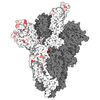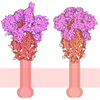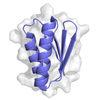[English] 日本語
 Yorodumi
Yorodumi- PDB-7kmk: cryo-EM structure of SARS-CoV-2 spike in complex with Fab 15033-7... -
+ Open data
Open data
- Basic information
Basic information
| Entry | Database: PDB / ID: 7kmk | ||||||
|---|---|---|---|---|---|---|---|
| Title | cryo-EM structure of SARS-CoV-2 spike in complex with Fab 15033-7, two RBDs bound | ||||||
 Components Components |
| ||||||
 Keywords Keywords | Viral protein/Immune System / SARS-CoV-2 / spike / Fab / Viral protein-Immune System complex | ||||||
| Function / homology |  Function and homology information Function and homology informationMaturation of spike protein / viral translation / Translation of Structural Proteins / Virion Assembly and Release / host cell surface / host extracellular space / symbiont-mediated-mediated suppression of host tetherin activity / Induction of Cell-Cell Fusion / structural constituent of virion / entry receptor-mediated virion attachment to host cell ...Maturation of spike protein / viral translation / Translation of Structural Proteins / Virion Assembly and Release / host cell surface / host extracellular space / symbiont-mediated-mediated suppression of host tetherin activity / Induction of Cell-Cell Fusion / structural constituent of virion / entry receptor-mediated virion attachment to host cell / membrane fusion / Attachment and Entry / host cell endoplasmic reticulum-Golgi intermediate compartment membrane / positive regulation of viral entry into host cell / receptor-mediated virion attachment to host cell / host cell surface receptor binding / symbiont-mediated suppression of host innate immune response / receptor ligand activity / endocytosis involved in viral entry into host cell / fusion of virus membrane with host plasma membrane / fusion of virus membrane with host endosome membrane / viral envelope / virion attachment to host cell / SARS-CoV-2 activates/modulates innate and adaptive immune responses / host cell plasma membrane / virion membrane / identical protein binding / membrane / plasma membrane Similarity search - Function | ||||||
| Biological species |   Homo sapiens (human) Homo sapiens (human) | ||||||
| Method | ELECTRON MICROSCOPY / single particle reconstruction / cryo EM / Resolution: 4.2 Å | ||||||
 Authors Authors | Li, Z. / Rini, J.M. | ||||||
| Funding support |  Canada, 1items Canada, 1items
| ||||||
 Citation Citation |  Journal: J Mol Biol / Year: 2021 Journal: J Mol Biol / Year: 2021Title: Tetravalent SARS-CoV-2 Neutralizing Antibodies Show Enhanced Potency and Resistance to Escape Mutations. Authors: Shane Miersch / Zhijie Li / Reza Saberianfar / Mart Ustav / James Brett Case / Levi Blazer / Chao Chen / Wei Ye / Alevtina Pavlenco / Maryna Gorelik / Julia Garcia Perez / Suryasree ...Authors: Shane Miersch / Zhijie Li / Reza Saberianfar / Mart Ustav / James Brett Case / Levi Blazer / Chao Chen / Wei Ye / Alevtina Pavlenco / Maryna Gorelik / Julia Garcia Perez / Suryasree Subramania / Serena Singh / Lynda Ploder / Safder Ganaie / Rita E Chen / Daisy W Leung / Pier Paolo Pandolfi / Giuseppe Novelli / Giulia Matusali / Francesca Colavita / Maria R Capobianchi / Suresh Jain / J B Gupta / Gaya K Amarasinghe / Michael S Diamond / James Rini / Sachdev S Sidhu /     Abstract: Neutralizing antibodies (nAbs) hold promise as therapeutics against COVID-19. Here, we describe protein engineering and modular design principles that have led to the development of synthetic ...Neutralizing antibodies (nAbs) hold promise as therapeutics against COVID-19. Here, we describe protein engineering and modular design principles that have led to the development of synthetic bivalent and tetravalent nAbs against SARS-CoV-2. The best nAb targets the host receptor binding site of the viral S-protein and tetravalent versions block entry with a potency exceeding bivalent nAbs by an order of magnitude. Structural studies show that both the bivalent and tetravalent nAbs can make multivalent interactions with a single S-protein trimer, consistent with the avidity and potency of these molecules. Significantly, we show that the tetravalent nAbs show increased tolerance to potential virus escape mutants and an emerging variant of concern. Bivalent and tetravalent nAbs can be produced at large-scale and are as stable and specific as approved antibody drugs. Our results provide a general framework for enhancing antiviral therapies against COVID-19 and related viral threats, and our strategy can be applied to virtually any antibody drug. #1: Journal: bioRxiv / Year: 2020 Title: Tetravalent SARS-CoV-2 Neutralizing Antibodies Show Enhanced Potency and Resistance to Escape Mutations. Authors: Shane Miersch / Zhijie Li / Reza Saberianfar / Mart Ustav / James Brett Case / Levi Blazer / Chao Chen / Wei Ye / Alevtina Pavlenco / Maryna Gorelik / Julia Garcia Perez / Suryasree ...Authors: Shane Miersch / Zhijie Li / Reza Saberianfar / Mart Ustav / James Brett Case / Levi Blazer / Chao Chen / Wei Ye / Alevtina Pavlenco / Maryna Gorelik / Julia Garcia Perez / Suryasree Subramania / Serena Singh / Lynda Ploder / Safder Ganaie / Rita E Chen / Daisy W Leung / Pier Paolo Pandolfi / Giuseppe Novelli / Giulia Matusali / Francesca Colavita / Maria R Capobianchi / Suresh Jain / J B Gupta / Gaya K Amarasinghe / Michael S Diamond / James Rini / Sachdev S Sidhu Abstract: Neutralizing antibodies (nAbs) hold promise as effective therapeutics against COVID-19. Here, we describe protein engineering and modular design principles that have led to the development of ...Neutralizing antibodies (nAbs) hold promise as effective therapeutics against COVID-19. Here, we describe protein engineering and modular design principles that have led to the development of synthetic bivalent and tetravalent nAbs against SARS-CoV-2. The best nAb targets the host receptor binding site of the viral S-protein and its tetravalent versions can block entry with a potency that exceeds the bivalent nAbs by an order of magnitude. Structural studies show that both the bivalent and tetravalent nAbs can make multivalent interactions with a single S-protein trimer, observations consistent with the avidity and potency of these molecules. Significantly, we show that the tetravalent nAbs show much increased tolerance to potential virus escape mutants. Bivalent and tetravalent nAbs can be produced at large-scale and are as stable and specific as approved antibody drugs. Our results provide a general framework for developing potent antiviral therapies against COVID-19 and related viral threats, and our strategy can be readily applied to any antibody drug currently in development. | ||||||
| History |
|
- Structure visualization
Structure visualization
| Movie |
 Movie viewer Movie viewer |
|---|---|
| Structure viewer | Molecule:  Molmil Molmil Jmol/JSmol Jmol/JSmol |
- Downloads & links
Downloads & links
- Download
Download
| PDBx/mmCIF format |  7kmk.cif.gz 7kmk.cif.gz | 706.1 KB | Display |  PDBx/mmCIF format PDBx/mmCIF format |
|---|---|---|---|---|
| PDB format |  pdb7kmk.ent.gz pdb7kmk.ent.gz | 575.7 KB | Display |  PDB format PDB format |
| PDBx/mmJSON format |  7kmk.json.gz 7kmk.json.gz | Tree view |  PDBx/mmJSON format PDBx/mmJSON format | |
| Others |  Other downloads Other downloads |
-Validation report
| Arichive directory |  https://data.pdbj.org/pub/pdb/validation_reports/km/7kmk https://data.pdbj.org/pub/pdb/validation_reports/km/7kmk ftp://data.pdbj.org/pub/pdb/validation_reports/km/7kmk ftp://data.pdbj.org/pub/pdb/validation_reports/km/7kmk | HTTPS FTP |
|---|
-Related structure data
| Related structure data |  22925MC 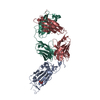 7klgC 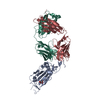 7klhC  7kmlC  7kxjC  7kxkC C: citing same article ( M: map data used to model this data |
|---|---|
| Similar structure data |
- Links
Links
- Assembly
Assembly
| Deposited unit | 
|
|---|---|
| 1 |
|
- Components
Components
-Protein , 1 types, 3 molecules ABC
| #1: Protein | Mass: 141170.250 Da / Num. of mol.: 3 Source method: isolated from a genetically manipulated source Source: (gene. exp.)  Gene: S, 2 / Production host:  Homo sapiens (human) / References: UniProt: P0DTC2 Homo sapiens (human) / References: UniProt: P0DTC2 |
|---|
-Antibody , 2 types, 4 molecules LMHI
| #2: Antibody | Mass: 23366.900 Da / Num. of mol.: 2 Source method: isolated from a genetically manipulated source Source: (gene. exp.)  Homo sapiens (human) / Production host: Homo sapiens (human) / Production host:  Homo sapiens (human) Homo sapiens (human)#3: Antibody | Mass: 23513.260 Da / Num. of mol.: 2 Source method: isolated from a genetically manipulated source Source: (gene. exp.)  Homo sapiens (human) / Production host: Homo sapiens (human) / Production host:  Homo sapiens (human) Homo sapiens (human) |
|---|
-Sugars , 3 types, 34 molecules 
| #4: Polysaccharide | 2-acetamido-2-deoxy-beta-D-glucopyranose-(1-4)-2-acetamido-2-deoxy-beta-D-glucopyranose #5: Polysaccharide | Source method: isolated from a genetically manipulated source #6: Sugar | ChemComp-NAG / |
|---|
-Details
| Has ligand of interest | N |
|---|---|
| Has protein modification | Y |
-Experimental details
-Experiment
| Experiment | Method: ELECTRON MICROSCOPY |
|---|---|
| EM experiment | Aggregation state: PARTICLE / 3D reconstruction method: single particle reconstruction |
- Sample preparation
Sample preparation
| Component | Name: SARS-CoV-2 spike protein in complex with Fab 15033-7 / Type: COMPLEX / Entity ID: #1-#3 / Source: RECOMBINANT | ||||||||||||
|---|---|---|---|---|---|---|---|---|---|---|---|---|---|
| Molecular weight | Experimental value: NO | ||||||||||||
| Source (natural) | Organism:  | ||||||||||||
| Source (recombinant) | Organism:  Homo sapiens (human) Homo sapiens (human) | ||||||||||||
| Buffer solution | pH: 7.2 | ||||||||||||
| Buffer component |
| ||||||||||||
| Specimen | Conc.: 0.4 mg/ml / Embedding applied: NO / Shadowing applied: NO / Staining applied: NO / Vitrification applied: YES Details: The Fab and the spike protein was mixed at 3:1 molar ratio. The total concentration of the proteins was 0.4 mg/mL. | ||||||||||||
| Specimen support | Details: current = 15 mA / Grid material: COPPER / Grid mesh size: 400 divisions/in. / Grid type: C-flat-2/2 | ||||||||||||
| Vitrification | Instrument: FEI VITROBOT MARK IV / Cryogen name: ETHANE / Humidity: 100 % / Chamber temperature: 277 K / Details: blotting force = 1 blotting time = 2.5 s |
- Electron microscopy imaging
Electron microscopy imaging
| Experimental equipment |  Model: Titan Krios / Image courtesy: FEI Company |
|---|---|
| Microscopy | Model: FEI TITAN KRIOS |
| Electron gun | Electron source:  FIELD EMISSION GUN / Accelerating voltage: 300 kV / Illumination mode: FLOOD BEAM FIELD EMISSION GUN / Accelerating voltage: 300 kV / Illumination mode: FLOOD BEAM |
| Electron lens | Mode: BRIGHT FIELD / Nominal magnification: 75000 X / Nominal defocus max: 2200 nm / Nominal defocus min: 1000 nm / Cs: 2.7 mm / Alignment procedure: COMA FREE |
| Specimen holder | Cryogen: NITROGEN / Specimen holder model: FEI TITAN KRIOS AUTOGRID HOLDER |
| Image recording | Average exposure time: 9 sec. / Electron dose: 38.08 e/Å2 / Film or detector model: FEI FALCON IV (4k x 4k) / Num. of grids imaged: 1 / Num. of real images: 6431 |
- Processing
Processing
| EM software |
| ||||||||||||||||||||||||||||
|---|---|---|---|---|---|---|---|---|---|---|---|---|---|---|---|---|---|---|---|---|---|---|---|---|---|---|---|---|---|
| CTF correction | Type: PHASE FLIPPING AND AMPLITUDE CORRECTION | ||||||||||||||||||||||||||||
| Symmetry | Point symmetry: C1 (asymmetric) | ||||||||||||||||||||||||||||
| 3D reconstruction | Resolution: 4.2 Å / Resolution method: FSC 0.143 CUT-OFF / Num. of particles: 85843 / Symmetry type: POINT | ||||||||||||||||||||||||||||
| Atomic model building | Protocol: RIGID BODY FIT / Space: REAL | ||||||||||||||||||||||||||||
| Atomic model building | 3D fitting-ID: 1 / Source name: PDB / Type: experimental model
|
 Movie
Movie Controller
Controller





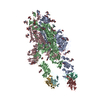
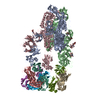

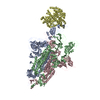

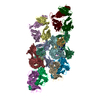

 PDBj
PDBj
